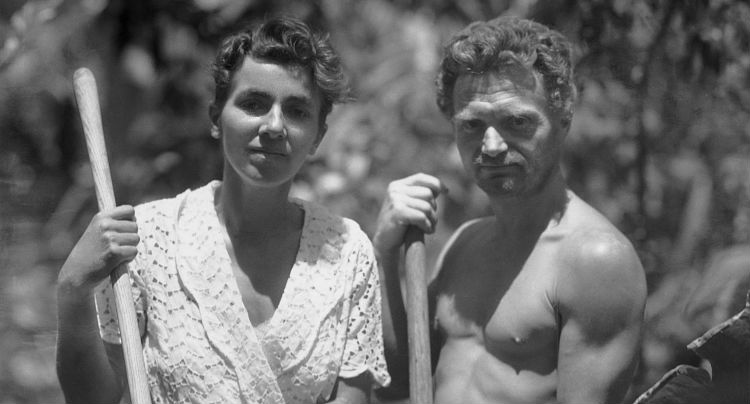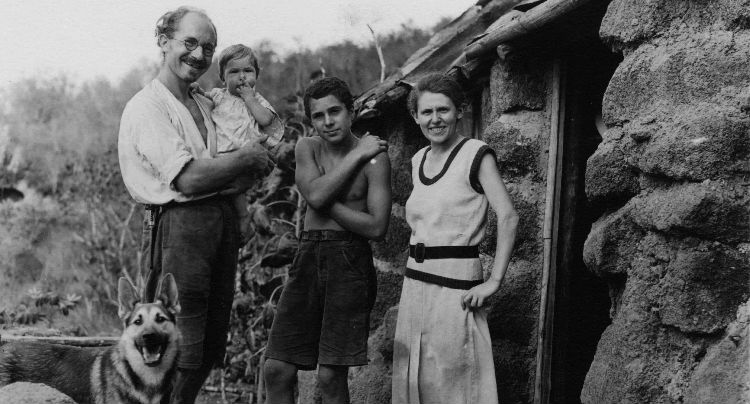
An intoxicating doc about the insanity of island isolation.

An intoxicating doc about the insanity of island isolation.
Paradise goes up in flames in The Galapagos Affair: Satan Came to Eden, a stranger-than-fiction murder mystery in documentary form. There’s something fascinatingly bizarre about the events surrounding the unexplained deaths that struck a handful of bickering European settlers that arrived at Galapagos in the 1930s. To tell the true-crime tale, directors Dayna Goldfine and Dan Geller combine a veritable treasure trove of archival film footage of the actual participants with dramatic readings of their diaries by an international cast (Cate Blanchett, Diane Kruger, Josh Radnor) and modern-day interviews with the descendants and acquaintances of the original settlers. It’s an absorbing examination of the psychological effects of being a societal outsider.
Beneath the obvious appeal of the Hitchcockian unsolved murders are deeper musings about the pitfalls of human isolation. In 1929, a German doctor and Nietzsche devotee by the name of Fredrich Ritter and his lover Dore Strauch fled their civilized home of Berlin (and their respective spouses) to start anew, alone, on the Galapagos island of Floreana. Their pie-in-the-sky dream was to carve out a splendid existence on the island, with Dr. Ritter free to form and jot down his philosophies and Strauch free to…well, play with her donkey, her only friend. (Ritter’s view on the role of women made Dore’s life in Eden considerably less ideal, as he considers her affection for the donkey a “great disappointment to me.”) The resourceful couple build a nice island life for themselves, growing a garden and even building a working shower.

Their private paradise wouldn’t remain private for long, however, as word of their “modern-day Adam and Eve” story made its way to Europe. Just a couple years after Ritter and Strauch staked their claim on Floreana, another couple, Heinz and Margaret Wittmer, boated ashore, shattering the couple’s tropical solitude. Fredrich was not pleased. Even more invasive was a maniacal, self-aggrandizing Austrian Baroness who settled on the island not long after, bringing with her a rifle, two young lovers, and plans to build a luxury resort for the wealthy to indulge in. Fredrich was incensed. “We shall resist the establishment of any community.”
The combustible relationships between the three parties eventually led to mysterious deaths, ones that no one has yet to explain. Goldfine and Geller take a whodunnit approach to the unsolved incidents, using charts, photos, and speculative modern-day interviews with island residents to piece together clues and present the various motives each of the settlers may have had to commit the strange atrocities. This portion of the film tickles the inner-detective (and gossiper) in all of us.
The photos and videos at Goldfine and Geller’s disposal are astounding, particularly footage of a silent film the sinister Baroness shot with her two slave boys, in which she reenacts her version of her interactions with Dr. Ritter and the other islanders. Her affection for the camera is disturbing. The Baroness, the most outlandish character in the film, is the only main participant that we don’t get a first-hand account from, as she didn’t keep a diary like the others. This adds to her nutty persona in a way.

Goldfine and Geller accentuate the weirdness of the tale with the playful interplay between the old footage and the actors’ readings. It’s haunting listening to the settlers describe the events of the photos we see on screen. One typically feels a certain disconnect when looking at old black and white photos like these, but the readings bridge that gap and give the photos an eerie immediacy.
The present-day interviews provide further insight into the psychology of island life, while also attempting to puff up the legend the murders, but they only succeed in the former. Though The Galapagos Affair is entirely intoxicating, it never feels as suspenseful as one would expect from a film billed as “Hitchcock-meets-Darwin”. The film’s score, by Laura Karpman, is fittingly kooky and one of Goldfine and Geller’s best assets. The weirdos on Floreana deserve nothing less.